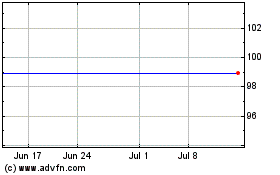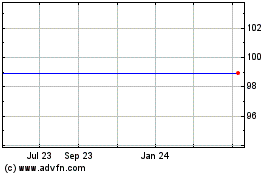There is a new mantra for those who trade on difficult deals:
'Don't fight the president'
By Rob Copeland, Gunjan Banerji and Liz Hoffman
The once-mighty merger arbitrager has been humbled.
Time Warner Inc. shares closed Tuesday some $20 a share below
the price spelled out Saturday in AT&T Inc.'s $85 billion
takeover bid.
The big discount in Time Warner's stock price means that an
investor who buys the stock today and holds it would make around
17% annualized if the deal closes on schedule late next year.
Yet even at a time of ultralow interest rates and intense
competitive pressure for investment returns, the tie-up is
attracting little interest from Wall Street traders, thanks in part
to concerns about potential regulatory action and lingering fear
that the postcrisis stock-market boom could be on borrowed
time.
It is the latest sign that the once-lucrative field of betting
on mergers isn't the sure win it used to be.
Wall Street is giving the deal just a 28% chance of closing at
the stated terms as of Tuesday's market close, according to Macro
Risk Advisors.
The AT&T deal has "got a long, long road ahead," said Robert
Zoellner Jr., chief executive of hedge fund Alpine Associates
Management.
For years, merger announcements large and small prompted money
managers to pile into shares of potential takeover targets while
selling the shares of the acquirers, often reaping substantial
profits when the deals closed later.
But that trade has broken down under pressure from several
factors, hedge-fund managers and others say. Many are turned off by
the perception that regulators are becoming more likely to block
many large deals, particularly those that match firms in the same
or similar businesses. Others cite risks associated with soaring
company valuations as U.S. stocks head for their eighth consecutive
year of gains, counting dividend payments. A substantial pullback
could potentially raise the prospect that the deal wouldn't be
closed on current terms.
Even when they aren't blocked, deals are getting bigger and
taking longer to complete, a turnoff for fast-moving traders who
look to make a quick buck employing merger- arbitrage
strategies.
The average U.S. deal size hit an all-time high of $476 million
last year, and there were a record 33 deals over $10 billion,
according to Dealogic.
Over the same period, the total assets controlled by hedge funds
dedicated to merger arbitrage have stayed roughly constant at
around $23 billion, according to HFR, meaning their firepower
hasn't kept pace with the mergers- and-acquisitions boom.
Merger-arbitrage-focused hedge funds are up 2% this year, half the
gain for hedge funds overall.
That has kept some company shares trading at big discounts, as
hedge funds can no longer fill the holes created when risk-averse
peers like mutual funds head for the exits following a deal
announcement.
Hedge-fund managers like John Paulson, a longtime merger
specialist, have shrunk by billions of dollars due to bad bets and
client redemptions. Mr. Paulson's flagship merger fund is down more
than 20% this year, a person familiar with the matter said.
For those managers who remain, much of their available cash is
stuck in limbo. The average $1 billion-plus deal that has been
agreed upon but not yet closed has been pending 144 days, the most
since 2002, Dealogic said.
"Merger arb is the classic 'standing in front of a steamroller
picking up nickels' business," said Roy Behren, who oversees about
$5 billion at Westchester Capital. "And it takes a lot of nickels
to make up for the dollars you lose" when a big deal goes sideways,
he said.
AT&T and Time Warner are hardly the only dsytaeals under
pressure, and many investors blame regulatory oversight.
AT&T Chief Executive Randall Stephenson has said the deal
isn't the type that regulators take issue with because the
combination of a content provider and distributor doesn't increase
industry concentration. AT&T said the merger "will produce real
innovation, better pricing for customers, a stronger competitor to
cable companies and significant financial benefits for investors."
A Time Warner representative didn't comment.
Shares of health insurers Cigna Corp. and Humana Inc., for
instance, are trading well below the value of their mega-mergers
with Anthem Inc., and Aetna Inc. respectively. The Justice
Department sued to block the deals; litigation is continuing.
Antitrust officials have already succeeded in blocking several
other deals, including Staples Inc.'s purchase of Office Depot
Inc., and oil servicer Halliburton Co.'s proposed $37 billion
takeover of rival Baker Hughes Inc.
Separately, tighter Treasury Department rules on inversions,
meant to head off companies from merging to move their tax
addresses out of the U.S., this year tanked Pfizer's $150 billion
takeover of Allergan Inc.
U.S regulatory officials and rivals have expressed concerns
about whether government restrictions were tough enough on Comcast
Corp.'s deal for NBCUniversal, a marriage of content and
distribution that is similar in ambition to AT&T's play for
Time Warner.
AT&T brings its own particular baggage to bear in this
arena, having abandoned its 2011 takeover of T-Mobile under
regulatory scrutiny.
Hedge-fund manager Drew Figdor of TIG Arbitrage Associates,
which specializes in merger bets, said all the government attention
motivated him to increase his shorts, or bets on deals falling
apart. He is wagering that Time Warner's stock will stay below the
AT&T deal price for the extended future.
Mr. Figdor said he forecast a continued harsh regulatory
environment, regardless of which political party takes the White
House. That has him trying a new turn on the long time Wall Street
axiom "Don't fight the Fed."
"If you're an arb investor, it's now 'Don't fight the
president,'" he said.
Write to Rob Copeland at rob.copeland@wsj.com and Liz Hoffman at
liz.hoffman@wsj.com
(END) Dow Jones Newswires
October 26, 2016 02:47 ET (06:47 GMT)
Copyright (c) 2016 Dow Jones & Company, Inc.
Time Warner (NYSE:TWX)
Historical Stock Chart
From Mar 2024 to Apr 2024

Time Warner (NYSE:TWX)
Historical Stock Chart
From Apr 2023 to Apr 2024
